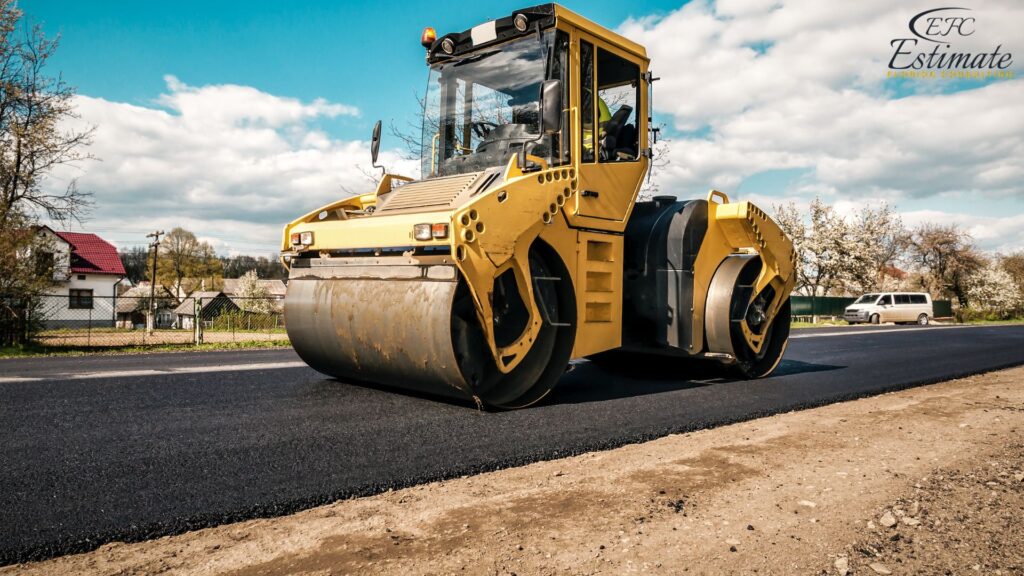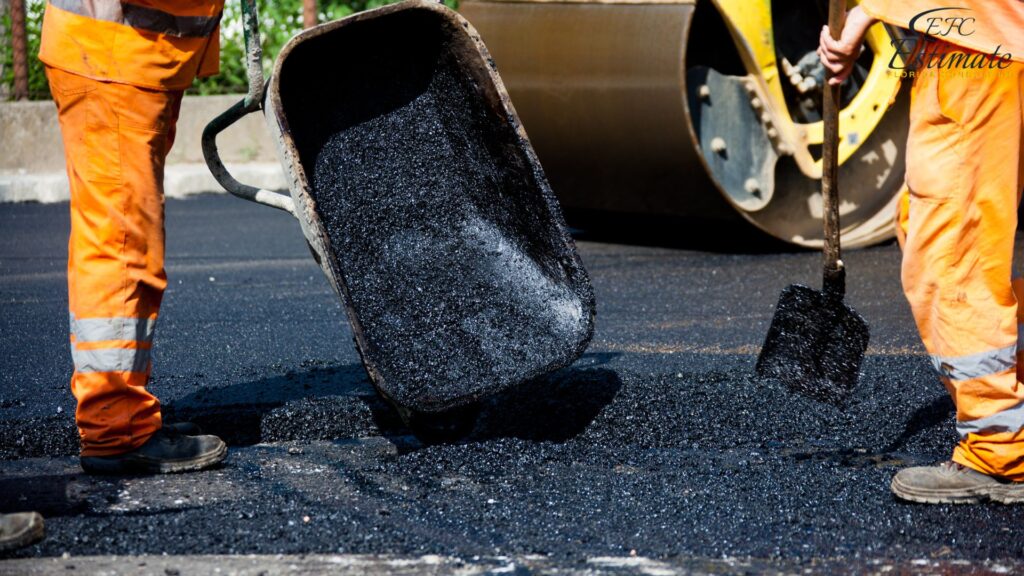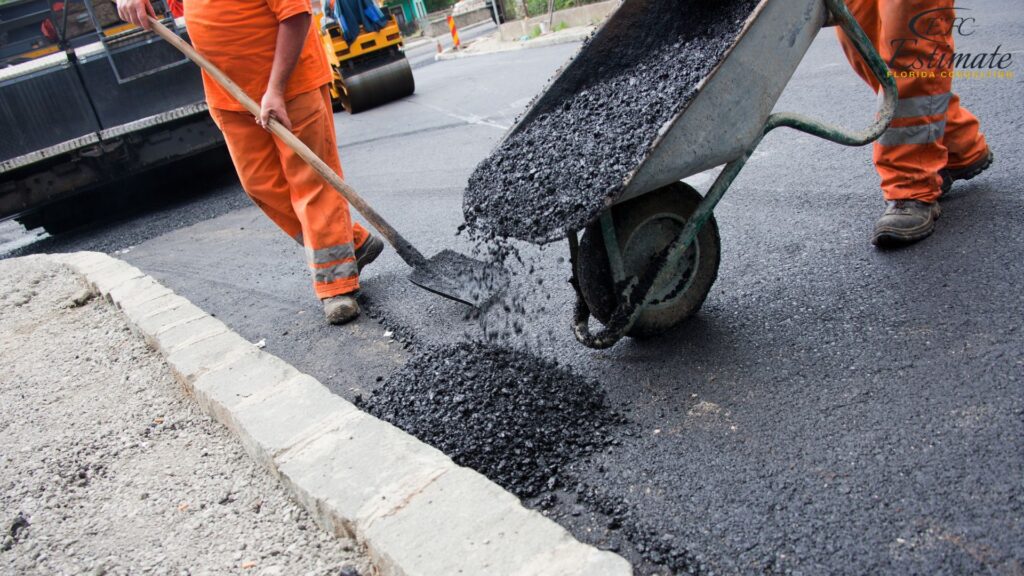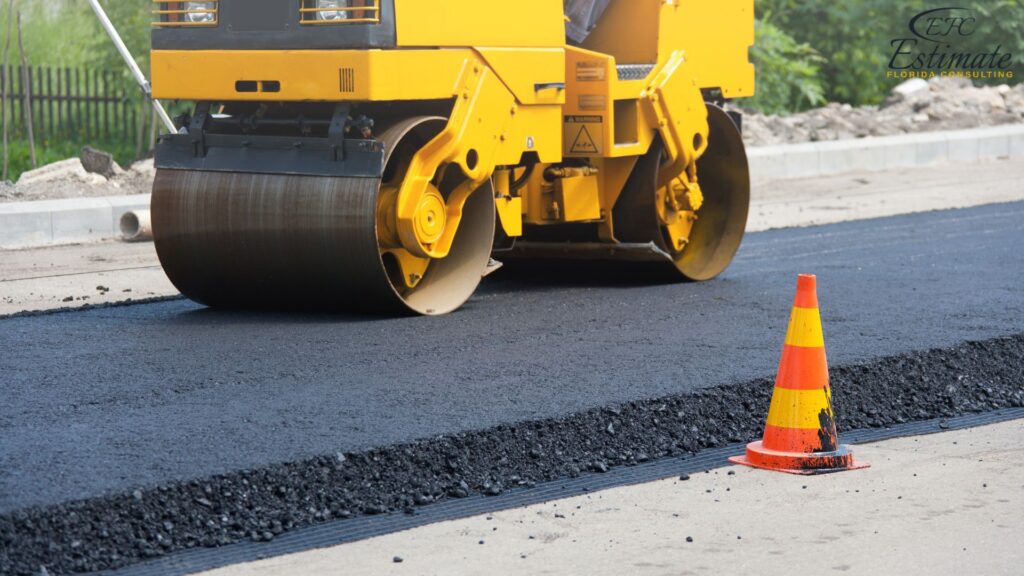How Much Does a Mile of Asphalt Cost?
The cost of paving a mile of asphalt varies depending on the road width. For a 2-lane road, which is typically 24 feet wide, the cost ranges from $528,000 to $924,000 per mile. For a 4-lane road, with a width of 48 feet, the cost ranges from $1,056,000 to $1,386,000 per mile. These estimates cover materials, labor, and basic site preparation. The final price can be influenced by factors such as location, terrain, and specific project requirements. Always consult with a professional contractor for a detailed estimate tailored to your project’s needs.

Average Cost to Lay a Mile of Asphalt
The average cost to lay a mile of asphalt ranges from $528,000 to $1,386,000. This price includes the cost of materials, labor, and additional expenses such as site preparation, grading, and any required permits. The cost per mile can vary significantly based on the specific requirements of the project and regional pricing differences. This range provides a comprehensive view of what to expect financially and helps in planning and allocation of resources efficiently. By considering all potential costs upfront, you can avoid budget overruns and ensure that all aspects of the project are adequately funded. Moreover, understanding the cost dynamics helps in negotiating better rates and choosing cost-effective solutions without compromising on quality.
Project Scope | Estimated Cost Range |
2-lane Road (24 feet wide) | $528,000 – $924,000 |
4-lane Road (48 feet wide) | $1,056,000 – $1,386,000 |
Factors Influencing the Cost
Type of Asphalt
The type of asphalt used can significantly impact the overall cost. There are several types of asphalt, each with different properties and cost implications. The choice of asphalt type can affect the longevity and performance of the road, making it an important consideration. Selecting the appropriate asphalt type ensures the road meets the necessary durability and usage requirements while balancing cost considerations. The decision should take into account the specific needs of the project, such as traffic volume, climate conditions, and budget constraints.
Asphalt Type | Estimated Cost per Ton |
Hot Mix Asphalt (HMA) | $70 – $100 |
Warm Mix Asphalt (WMA) | $80 – $120 |
Recycled Asphalt (RAP) | $50 – $80 |
Hot Mix Asphalt (HMA) is the most commonly used type and offers excellent durability, making it suitable for most road projects. It is produced at high temperatures, which allows for better compaction and a smoother finish. Warm Mix Asphalt (WMA) is more environmentally friendly and can be laid at lower temperatures, reducing energy costs and emissions. This type of asphalt can be particularly beneficial in cooler climates where traditional asphalt may cool too quickly. Recycled Asphalt (RAP) is a cost-effective and sustainable option, utilizing reclaimed asphalt pavement, which reduces waste and the need for new raw materials. This not only lowers costs but also supports environmental sustainability by recycling materials. Each type of asphalt has its specific applications and benefits, making it suitable for different project requirements and environmental conditions.
Thickness of Asphalt Layers
The thickness of the asphalt layers also affects the total cost. Typical asphalt roads consist of multiple layers, including a base layer, binder layer, and surface layer. The thickness of these layers can vary based on the intended use and load-bearing requirements of the road, influencing both the durability and the cost. Ensuring the correct thickness for each layer is critical to the road’s performance and longevity. Proper layer thickness is essential to withstand the stress from traffic loads and environmental conditions, preventing premature wear and damage.
Layer Type | Typical Thickness | Cost per Square Yard |
Base Layer | 6 – 8 inches | $20 – $30 |
Binder Layer | 3 – 4 inches | $15 – $25 |
Surface Layer | 1.5 – 2 inches | $10 – $15 |
Thicker layers provide greater durability and can handle heavier traffic loads, but they also increase the overall cost of the project. Proper layer thickness ensures that the road can withstand various stresses and environmental conditions, reducing maintenance costs and prolonging the road’s lifespan. Each layer plays a specific role in the road structure, with the base providing foundational support, the binder offering strength and flexibility, and the surface layer ensuring a smooth driving experience. The investment in appropriate thickness pays off in reduced repair costs and extended service life of the road.

Geographical Location
The cost of asphalt paving can vary based on geographical location due to differences in labor rates, material availability, and regional demand. Urban areas typically have higher labor costs compared to rural areas, and the availability of local materials can also impact pricing. These regional variations can significantly affect the overall project budget, and it’s important to account for them when planning your project. Understanding local cost dynamics helps in better financial planning and can uncover opportunities for cost savings.
Location Type | Cost Increase Percentage | Adjusted Cost Range |
Urban | +15% | $606,000 – $1,593,900 |
Suburban | +10% | $580,800 – $1,524,600 |
Rural | -5% | $501,600 – $1,316,700 |
Urban areas often face higher costs due to increased labor rates and logistical challenges, such as traffic and access restrictions. These factors can complicate the construction process and increase the time required to complete the project. Conversely, rural areas may benefit from lower labor costs but face higher transportation expenses for materials, particularly if local suppliers are not available. Understanding these geographical cost variations can help you better anticipate expenses and plan accordingly. Additionally, local regulations and environmental considerations can also influence project costs and timelines.
Site Preparation
Proper site preparation is crucial for the successful laying of asphalt. This includes clearing the site, grading, and ensuring proper drainage. The condition of the existing site can significantly impact the cost of preparation, as sites that require extensive work will increase the project budget. Thorough site preparation ensures a stable foundation for the asphalt, which is essential for the road’s longevity and performance. Investing in site preparation minimizes the risk of future issues and costly repairs.
Project Scope | Estimated Cost Range |
2-lane Road (24 feet wide) | $528,000 – $924,000 |
4-lane Road (48 feet wide) | $1,056,000 – $1,386,000 |
Site preparation ensures a stable foundation for the asphalt and helps prevent future issues such as potholes and water damage. Proper grading and drainage installation are essential to maintain the integrity of the road and prevent costly repairs due to water damage or structural failure. Investing in thorough site preparation can significantly reduce long-term maintenance costs and enhance the road’s durability and safety. The upfront cost of site preparation pays off by extending the life of the road and reducing the frequency and severity of repairs needed over time.

Permits and Regulations
Obtaining the necessary permits and complying with local regulations are essential steps in the asphalt paving process. Permit costs can vary based on location and the scope of the project. Ensuring all legal requirements are met helps avoid fines and ensures that the project adheres to safety and environmental standards. Navigating the permitting process effectively ensures the project proceeds without legal complications and delays.
Permit Type | Estimated Cost Range |
Construction Permit | $1,000 – $5,000 |
Environmental Permit | $1,000 – $3,000 |
Ensuring compliance with local regulations helps avoid fines and ensures that the project meets all safety and environmental standards. This compliance is critical for the long-term success and legality of the project, preventing future legal issues and ensuring public safety. Proper permitting also facilitates inspections and approvals, which are necessary to verify that the construction meets all required codes and standards. Adhering to these regulations helps build community trust and reduces the risk of costly legal disputes.
Additional Features
Additional features such as signage, road markings, and guardrails can add to the overall cost of the project. These features enhance the safety and functionality of the road, making it safer and more user-friendly. Including these features in the initial construction phase can ensure they are integrated seamlessly and cost-effectively. Thoughtfully planned additional features contribute to the road’s usability and compliance with safety standards.
Feature Type | Estimated Cost per Mile |
Signage | $2,000 – $5,000 |
Road Markings | $1,500 – $3,000 |
Guardrails | $7,000 – $10,000 |
Including these features in the initial construction can be more cost-effective than adding them later. Proper signage and markings are essential for road safety, guiding drivers and preventing accidents. Guardrails provide additional safety, especially in areas with sharp curves or steep embankments. These features also contribute to the overall usability and compliance of the road, ensuring it meets modern standards for safety and accessibility. Investing in these safety measures not only protects drivers but also reduces liability for road managers.
Benefits of Asphalt Roads
Asphalt roads offer several advantages, including durability, smoothness, and ease of maintenance. Asphalt is a flexible material that can withstand various weather conditions and heavy traffic loads. It also provides a smooth and quiet driving surface, enhancing the driving experience. Additionally, asphalt roads are relatively easy to maintain and repair, with quick turnaround times for maintenance work. These benefits make asphalt a preferred choice for many road construction projects, providing long-term value and reliability. The versatility of asphalt makes it suitable for a wide range of applications, from highways to local roads.
Download Template For Asphalt Project Breakdown
- Materials list updated to the zip code
- Fast delivery
- Data base of general contractors and sub-contractors
- Local estimators

Comparison with Other Paving Materials
While asphalt is a popular choice for road construction, other materials such as concrete and gravel are also used. Each material has its own set of advantages and disadvantages, and the choice will depend on the specific needs and budget of the project. Understanding the pros and cons of each material can help you make an informed decision that aligns with your project goals and financial constraints. Evaluating different materials allows for selecting the most appropriate one based on durability, maintenance needs, and cost-effectiveness.
Material Type | Estimated Cost per Mile | Durability | Maintenance |
Asphalt | $528,000 – $1,386,000 | High | Moderate |
Concrete | $1,000,000 – $2,000,000 | Very High | Low |
Gravel | $500,000 – $750,000 | Moderate | High |
Concrete roads are highly durable and require less maintenance but come at a higher initial cost. Concrete’s rigidity makes it ideal for areas with heavy loads, such as industrial zones or highways. Gravel roads are cheaper to install but require frequent maintenance and are less durable than asphalt and concrete. Gravel is often used in rural or temporary road applications where budget constraints are a primary concern. Each material has its specific applications and benefits, making them suitable for different types of projects and usage scenarios. Choosing the right material involves balancing initial costs with long-term maintenance and performance requirements.
Cost Breakdown by Project Scope
Here’s a detailed breakdown of the potential costs based on different project scopes:
2-lane Road (24 feet wide)
Cost Category | Estimated Cost Range |
Asphalt Materials | $350,000 – $525,000 |
Labor Costs | $150,000 – $300,000 |
Site Preparation | $25,000 – $45,000 |
Permits and Regulations | $2,000 – $8,000 |
Additional Features | $1,000 – $10,000 |
A 2-lane road is typically used for local roads and minor highways. It requires less material and labor compared to larger roads, resulting in lower overall costs. This type of road is ideal for areas with lower traffic volumes and simpler logistical requirements. The cost savings make it a practical choice for communities looking to improve infrastructure without a massive financial outlay. Properly planning the project scope ensures that resources are allocated efficiently, meeting the specific needs of the area while staying within budget.
4-lane Road (48 feet wide)
Cost Category | Estimated Cost Range |
Asphalt Materials | $700,000 – $1,050,000 |
Labor Costs | $300,000 – $600,000 |
Site Preparation | $50,000 – $90,000 |
Permits and Regulations | $4,000 – $16,000 |
Additional Features | $2,000 – $20,000 |
A 4-lane road is typically used for major highways and arterial roads. It requires more material and labor, resulting in higher overall costs compared to a 2-lane road. This type of road is designed to handle higher traffic volumes and more significant logistical challenges. The increased capacity and durability make it suitable for high-traffic areas and long-term infrastructure projects. The higher initial investment in a 4-lane road can lead to long-term benefits in terms of traffic management and road lifespan.
Maintenance Costs
Regular maintenance is essential to prolong the lifespan of asphalt roads. This includes sealcoating, crack filling, and pothole repair. Maintenance costs can vary based on the condition of the road and the extent of the damage. Implementing a proactive maintenance schedule can prevent minor issues from becoming major repairs, saving money in the long run. Regular upkeep ensures the road remains safe and functional, reducing the likelihood of accidents and extending its useful life.
Maintenance Task | Estimated Cost per Mile |
Sealcoating | $5,000 – $10,000 |
Crack Filling | $2,000 – $4,000 |
Pothole Repair | $1,500 – $3,000 |

Regular maintenance helps to extend the life of the road, maintain a smooth driving surface, and reduce the likelihood of significant repair costs. Sealcoating protects the asphalt from the elements and traffic wear, while crack filling prevents water from seeping into the base layer and causing damage. Pothole repair ensures safety and prevents further deterioration of the road surface. Investing in maintenance not only preserves the road’s condition but also optimizes its performance and safety for users.
Environmental Considerations
Asphalt production and paving have environmental impacts, including emissions from machinery and the asphalt plant. Using recycled materials and adopting sustainable practices can help mitigate these effects. Warm Mix Asphalt (WMA) and Recycled Asphalt Pavement (RAP) are eco-friendly options that reduce energy consumption and material waste. Implementing sustainable practices not only benefits the environment but can also improve community relations and meet regulatory requirements. Sustainable construction practices contribute to long-term environmental health and can enhance the project’s overall acceptance and success.
Get 5 New Leads Next 7 Days With Our System
- Multi-Family House
- Single-Faimly House
- Modern House
- Duplex
- Ranch House
- Bungalow
Conclusion
Paving a mile of asphalt road involves various costs depending on the type of asphalt, the thickness of the layers, the geographical location, and additional expenses such as site preparation and permits. By understanding these factors and planning accordingly, you can create a realistic budget and ensure a successful asphalt paving project. Proper planning, quality materials, and skilled labor are essential for achieving a durable and smooth asphalt road. Investing in high-quality asphalt and ensuring proper installation can provide long-term benefits and reduce maintenance costs over the lifespan of the road. Careful consideration of all aspects of the project, from initial planning to ongoing maintenance, ensures the best outcomes for both functionality and cost-efficiency. Thorough planning and execution help in building robust infrastructure that meets current needs and accommodates future growth.
FAQs
The cost of paving a mile of asphalt varies depending on the road width. For a 2-lane road (24 feet wide), the cost ranges from $528,000 to $924,000 per mile. For a 4-lane road (48 feet wide), the cost ranges from $1,056,000 to $1,386,000 per mile.
Factors include the type of asphalt, the thickness of asphalt layers, geographical location, site preparation requirements, permits and regulations, and additional features such as signage, road markings, and guardrails.
The average cost to lay a mile of asphalt ranges from $528,000 to $1,386,000. This price includes materials, labor, site preparation, grading, and any required permits.
Different types of asphalt have varying costs and properties. Hot Mix Asphalt (HMA) costs $70 – $100 per ton, Warm Mix Asphalt (WMA) costs $80 – $120 per ton, and Recycled Asphalt (RAP) costs $50 – $80 per ton.
The thickness of the asphalt layers affects the total cost. Typical thicknesses and costs per square yard are:
- Base Layer (6 – 8 inches): $20 – $30
- Binder Layer (3 – 4 inches): $15 – $25
- Surface Layer (1.5 – 2 inches): $10 – $15
Costs vary based on labor rates, material availability, and regional demand. Urban areas typically have higher costs (+15%), suburban areas have moderate costs (+10%), and rural areas have lower costs (-5%).
Site preparation includes clearing the site, grading, and ensuring proper drainage. Costs for site preparation range from $25,000 to $90,000 depending on the project scope.
Google Reviews



Process To Get Asphalt Cost Estimate Report
Here I am going to share some steps to get asphalt cost estimate report.
-
You need to send your plan to us.
You can send us your plan on info@estimatorflorida.com
-
You receive a quote for your project.
Before starting your project, we send you a quote for your service. That quote will have detailed information about your project. Here you will get information about the size, difficulty, complexity and bid date when determining pricing.
-
Get Estimate Report
Our team will takeoff and estimate your project. When we deliver you’ll receive a PDF and an Excel file of your estimate. We can also offer construction lead generation services for the jobs you’d like to pursue further.

